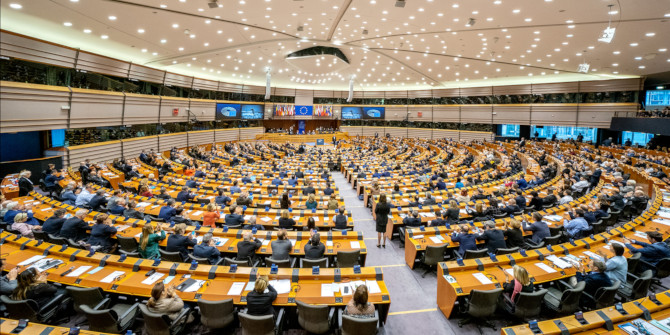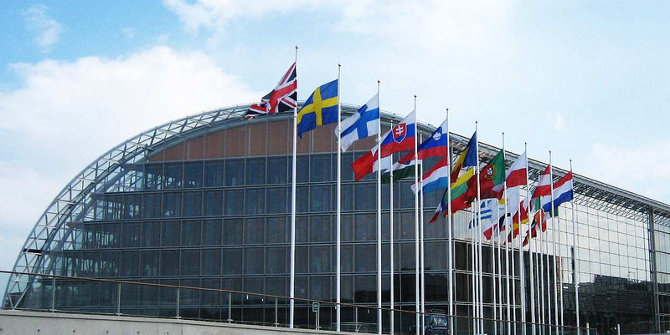 The European Commission is expected to announce new proposals in the coming months which will aim to reform the so called ‘Dublin regulation’ that assigns responsibility over asylum applications to EU member states. According to a recent statement by the European Commissioner for Migration, Home Affairs and Citizenship, Dimitris Avramopoulos, the new proposal will be based on a ‘distribution key’ system, which will semi-automatically assign applications to individual states. Nando Sigona argues that given the slow implementation of previous agreements, notably the relocation scheme for asylum seekers agreed in September 2015, there are reasons to doubt whether such a proposal would have the capacity to help solve the current crisis.
The European Commission is expected to announce new proposals in the coming months which will aim to reform the so called ‘Dublin regulation’ that assigns responsibility over asylum applications to EU member states. According to a recent statement by the European Commissioner for Migration, Home Affairs and Citizenship, Dimitris Avramopoulos, the new proposal will be based on a ‘distribution key’ system, which will semi-automatically assign applications to individual states. Nando Sigona argues that given the slow implementation of previous agreements, notably the relocation scheme for asylum seekers agreed in September 2015, there are reasons to doubt whether such a proposal would have the capacity to help solve the current crisis.
The Dublin regulation, which determines the EU member state responsible for asylum applications, has attracted plenty of criticism since it was established in the 1990s. The regulation, which has existed in three separate incarnations, has been critiqued on various grounds and from various statutory and non-statutory actors – the most noticeable objection perhaps being that it is a system which impacts unevenly on EU member states, with those countries at the EU’s southern border particularly exposed because of their geographic position.
These countries have traditionally reacted to the pressure imposed by the Dublin regulation in two distinct ways. Formally, they have responded by complaining about the implications of the regulation and demanding more solidarity from other member states who are less exposed to arrivals, such as those in northern Europe. Informally, however, they have also allowed people to slip through their bureaucratic net.
These strategies have included, for instance, failing to finger-print all migrants arriving on their shores, as in the case of Italy; and creating or allowing, as in the case of Greece, such poor reception conditions for asylum seekers that other member states (under pressure from their judiciary and civil society) have been forced to stop short of returning so called ‘Dublin cases’ on human rights grounds.
Is a distribution key the solution to the EU’s refugee crisis?
The emergence of the refugee crisis has led to the de facto suspension of the Dublin regulation. The scale of the events taking place over the last year has further intensified calls for a substantial revamp of the system, whose limitations have become widely apparent as Europe has sought to deal with the unfolding crisis.

It therefore came as no surprise when the European Commissioner for Migration, Home Affairs and Citizenship, Dimitris Avramopoulos, announced on 14 January that the Commission is planning a radical reform of the Dublin regulation. This would include the introduction of a ‘quasi-automatic’ distribution key system for assigning the responsibility over asylum applications to individual member states. As Avramopolous told MEPs in the European Parliament’s Committee on Civil Liberties, Justice and Home Affairs, ‘Dublin should not be any more just a mechanism to allocate responsibility’. The aim is to create ‘a solidarity instrument among member states’.
We don’t need to go back very far in history to recall the strenuous opposition that many member states displayed over the summer months of 2015 to any proposal for the relocation of asylum seekers registered in Italy, Greece and Hungary to other member states. After numerous EU summits and a relatively large degree of muscle-flexing on the part of states like Germany and Italy, EU member states eventually and reluctantly agreed last September to relocate 160,000 asylum seekers in two years.
As of 14 January, however, when Avramopolous made his announcement, member states had made available only 4,237 places (2.5 per cent of those promised). Moreover, they had only managed to relocate 272 refugees over this period (0.17 per cent of the pledged 160,000).
The implementation so far of the relocation scheme doesn’t provide much in the way of hope with respect to the ability of the European Commission to implement a quasi-automatic redistribution system. This is particularly the case when we consider that the new system would likely involve far larger numbers than the 160,000 asylum seekers contained in the September agreement.
It highlights instead two major weaknesses that may be fatal for the new proposed system: firstly, there is no evidence of a regained spirit of solidarity among EU states which would be an essential requirement for such a grand scheme to work. Secondly, the slow start of the relocation scheme confirms the EU tendency to create new bureaucratic mechanisms that are expensive, time-consuming and not very efficient. To underscore the point, some 40 liaison officers and 200 experts have been appointed to implement the relocation scheme so far. Roughly speaking, this is almost one expert per resettled refugee and one liaison officer for every five resettled refugees. It is difficult to look at this experience and perceive it as offering value for money. On the contrary, it further undermines the trust of people in the capacity of the EU to display leadership in handling the ongoing crisis.
Please read our comments policy before commenting.
Note: This article gives the views of the author, and not the position of EUROPP – European Politics and Policy, nor of the London School of Economics.
Shortened URL for this post: http://bit.ly/1JaMQu4
_________________________________
 Nando Sigona – University of Birmingham
Nando Sigona – University of Birmingham
Nando Sigona is a Senior Lecturer and Birmingham Fellow at the University of Birmingham and Deputy Director of the Institute for Research into Superdiversity. He is also a founding editor of the journal Migration Studies. He is the co-author of Sans Papiers: The Social and Economic Lives of Undocumented Migrants (Pluto Press, 2014) and co-editor of The Oxford Handbook of Refugee and Forced Migration Studies (Oxford University Press, 2014). He tweets @nandosigona






The European Commission doesn’t have the strength of a real supranational institution: until it cannot force every and each EU country to do its share, its policies, good or bad, will never work. Could an economic sanction help? A quota of refugees per State is decided, a (short) term for relocation stated. Then countries who have taken less people then planned will pay a fine. The money would go to those countries who have more refugees than their quota said, i.e. those at the european borders.
Still, if european countries won’t make their mind about working together instead of being in competition, little result will be achievable.
Thanks for the article, very clear and sums it up perfectly.
I can’t wait to see how this issue is going to evolve.